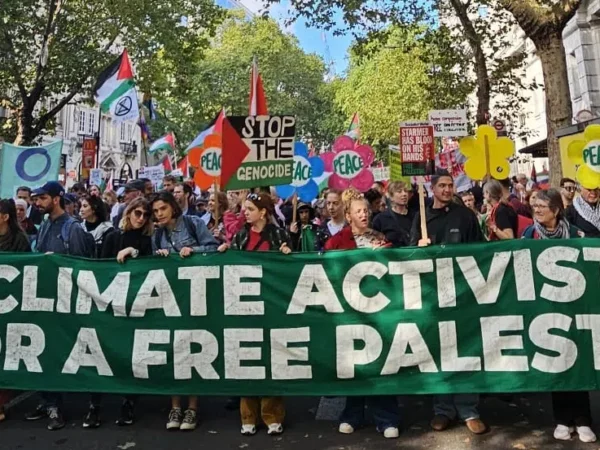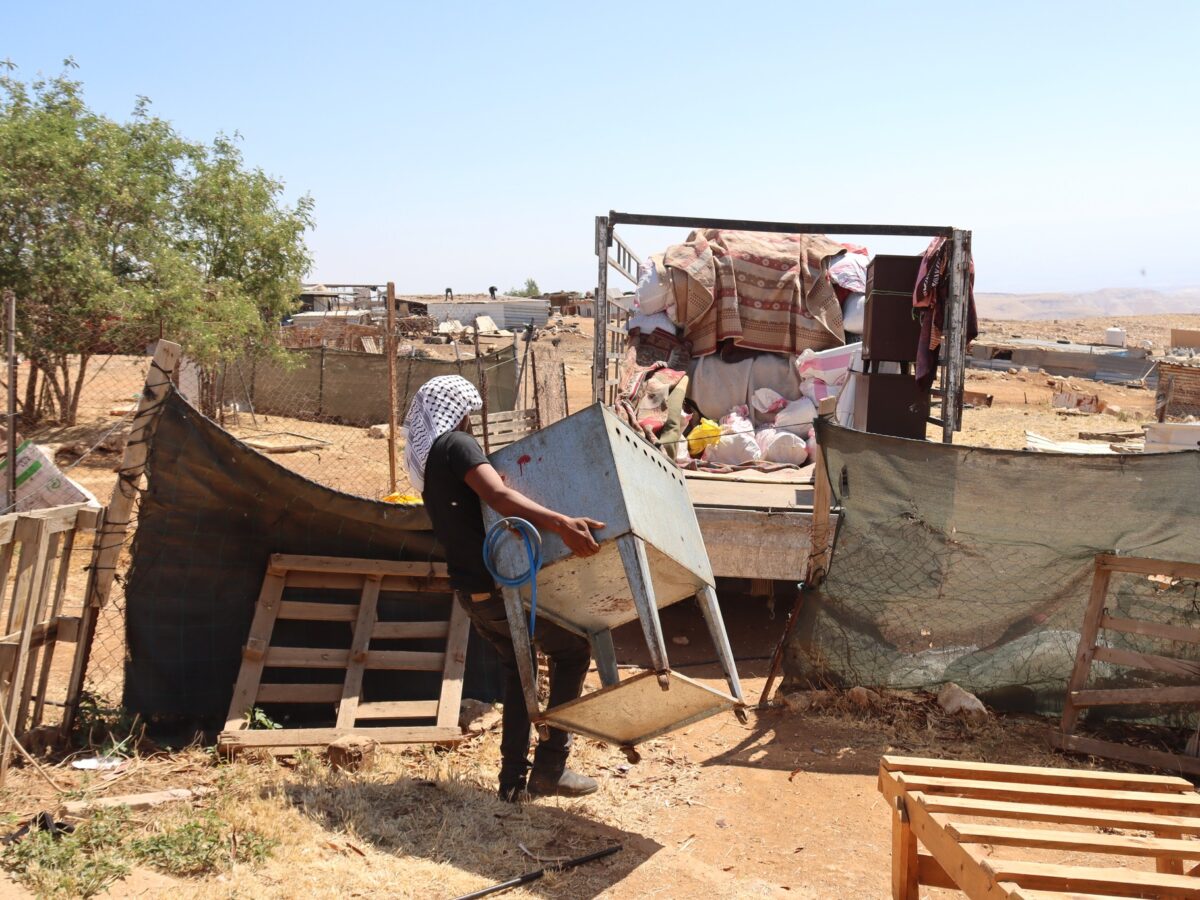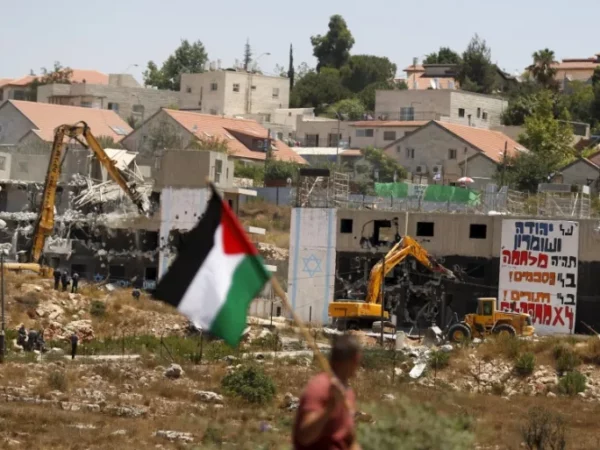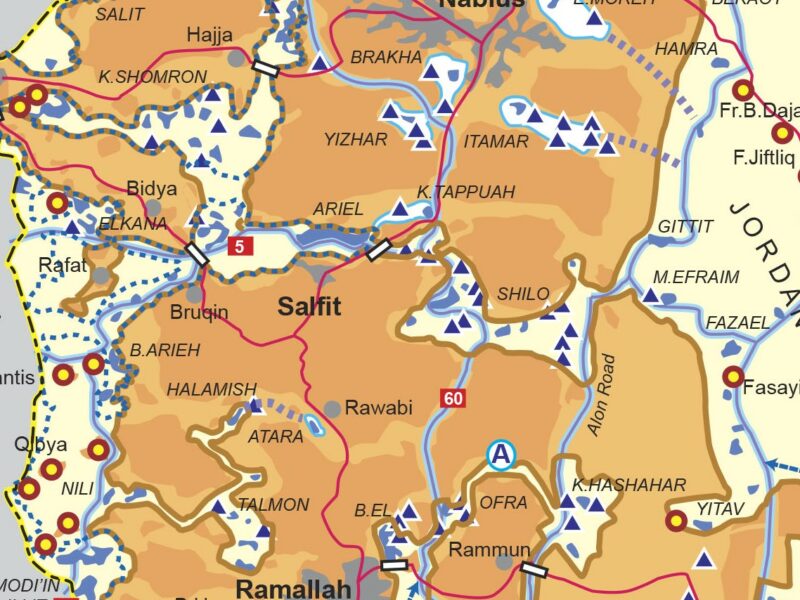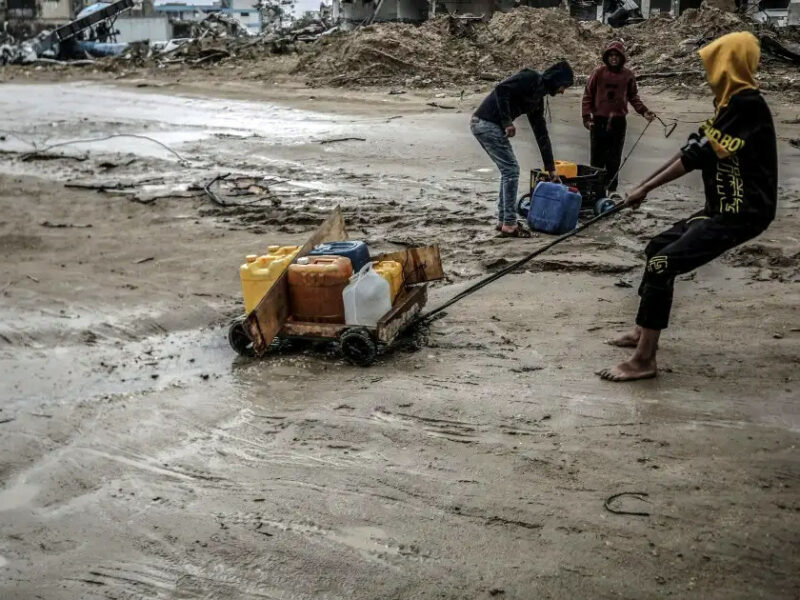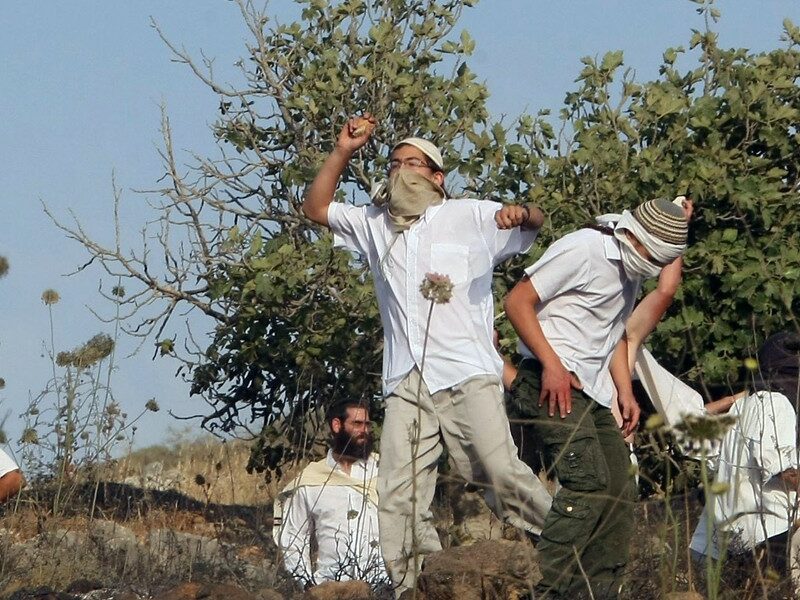The Right to a Home
Palestinian refugees are the first and largest group of victims of the creation of the state of Israel and its efforts to replace the indigenous Palestinian population and to colonize the land.
The expulsion of the Palestinian people has been since the beginning planned and systematic. By 15 May 1948, when the establishment of the State of Israel was announced and the surrounding Arab states declared war, around 300,000 Palestinians had already been expelled from their homes. By 1949, Israel had conquered 78% of Palestine and the number of Palestinian refugees had reached close to 800,000. Israeli forces destroyed over 500 Palestinian villages and 11 towns during this period, called by Palestinians the Nakba (Arabic: catastrophe).
The Nakba is not only a historic event but an ongoing process. After this initial mass expulsion Israel has never stopped expelling Palestinians from their homes. Today, over 7.25 million Palestinians are refugees. They make up the the majority of the Palestinian people. Hence, the struggle for the Right to Return to their homes and land from where they have been expelled is at the core of the Palestinian cause.
A permit to exist
During 1947-49 and then during the war that led to the occupation of the West Bank, the Gaza Strip and the Syrian Golan Heights, Israel expelled Palestinians literally at gunpoint. Yet, the means Israeli authorities have developed in order to displace Palestinians reach much further. They can be legal, economic or other forms of direct or indirect coercion to force Palestinians away.
The demolitions of homes and communities – and ongoing and daily process – are a common experience to all Palestinians living under Israeli control and embody the full cruelty of this daily onslaught on the people.
The demolition policy comes at the end of a process whereby Palestinian homes, communities and their very presence are not recognized and are considered illegal. In one form or another, Israeli laws or military orders will define the existence of the homes and communities as illegal. They are denied even essential infrastructure and finally demolished.
Demolitions and evictions
In the occupied West Bank, including East Jerusalem over the last decade UN OCHA has recorded how Israeli demolition orders have displaced 11,549 people and impacted on 124,458. In East Jerusalem alone, 2,819 Palestinians have been displaced through demolitions and 7,418 impacted. The overwhelming majority of the rest of the displacements have happened to Palestinians living in Area C, in areas Israel is de facto annexing.
46 communities in Area C of the West Bank are under direct threat of complete destruction and expulsion. 297 986 Palestinians in Area C have already experienced demolitions since 2000.
The amount of demolitions are dramatically increased during 2020, despite the pandemic and global calls for a freeze in evictions and demolitions. In 2020, 848 Palestinian structures have been destroyed or damaged and 996 Palestinians have been displaced. This was the highest number of demolitions since UN OCHA started its statistics, with the exception of 2016. Since the beginning of 2021 alone, at least 152 structures, of which 37 were donated, have been destroyed, rendering at least 184 Palestinians homeless.
In East Jerusalem the revocation of ‘permanent residency status’, the special ‘permit’ of existence that Israel gives or denies to Palestinians in Jerusalem is the most direct and common tool used to forcibly transfer Palestinians from occupied East Jerusalem. Since the occupation of the eastern part of the city in 1967, Israel has revoked residency status of over 14,500 Palestinians.

Home demolitions are recurring experience as well for Palestinian citizens of Israel. Most affected are the Palestinian Bedouin villages in the Naqab (Negev), which Israel simply refuses to ‘recognize’ and thus turns ‘illegal’. In 2013, the Israeli government announced the Prawer Plan, a masterplan for the displacement and destruction of homes and communities of up to 70 000 Palestinians in the Naqab. Palestinians continue to resist the implementation of the plan, yet demolitions are ongoing.
Palestinians in the occupied and besieged Gaza Strip have suffered from the destruction of their homes in particular through the creation in 2005 of a ‘buffer zone’ along the wall that isolated Gaza from the rest of the world. Thousands of residential and agricultural structures have been demolished. The two military assaults and massacres Israel carried out against Gaza in 2012 and 2014 included the mass destruction of homes. During the 2012 attack some 2,000 Palestinians were displaced. In 2014 Israeli military destroyed or severely damaged the homes of about 100,000 people.
Segregation and fragmentation
Israel’s efforts of expulsion are based on the Zionist paradigm of Jewish supremacy over the Palestinian people and the effort to create and maintain a Jewish majority on the land. Segregation of the Palestinian people from Jewish population, fragmentation of the Palestinian society with the aim to dismember it and to efforts to isolate one part from the other are part of the process to weaken Palestinian resistance and steadfastness. BADIL Resource Center for Palestinian Residency and Refugee Rights highlights the effect of these practices:
“In its tangible form, this is a policy that seeks the creation of a coercive environment that alienates the people from each other and their land, thereby compelling them to seek a better future elsewhere, and overshadowing the fact that their displacement is actually unintentional and compelled. Unable to sustain the increasing social and economic pressure that comes from the concentration and splintering of the social fabric, Palestinians move from villages into towns, especially from Area C and the Naqab, in pursuit of basic services and economic opportunities. They then from towns into cities, which are themselves severely restricted and marginalized in their opportunities and development; ultimately, Palestinians may seek to leave Mandatory Palestine altogether.”
Reality on the Ground
In the Jordan Valley
Khirbet Humsa al-Fawqa, a Palestinian community in the Jordan Valley, is but one example of Israel’s systematic policy of destruction and expulsion.
Homes and other structures of Humsa were demolished and confiscated in 2012, 2013, 2014, 2017, 2018, 2020, and now in 2021. In February 2021, Israeli occupying authorities have targeted, raided, and demolished Humsa six times.
The community has built and lived in Humsa long before Israel occupied this Palestinian territory in 1967. Since then, the 11 Palestinian families have been denied access to construction permits, access to water, health and educational facilities in the village.
Israeli forces frequently raid and attack Humsa and have demolished and confiscated homes and structures repeatedly since 2012. JCB, Volvo and CAT bulldozers have aided the Israeli military forces in the latest demolitions.
Humsa is particularly targeted as part of Israel’s effort to annex the Jordan Valley and to extend its sovereigny until the Jordan River. Yet, Palestinians in Humsa continue steadfast in the face of ongoing Israeli settler-colonialism and apartheid.
In Jerusalem
Israeli occupation authorities are since they took control over East Jerusalem developing ever more sophisticated strategies to expel Palestinians from the city. They carry out extensive home demolitions but in addition use evictions from houses that are then taken over by settlers as another means to ethnically cleanse the city. This tactic is as well used in the Old City of Hebron.
Sheikh Jarrah neighborhood, located on the mountain of Al-Masharef to the north of the city of Jerusalem, outside the old city is a prime example. In 1972, the Sephardic Community Committee and the Knesset Yisrael Committee, two bigoted settler organizations, started waging a war against Palestinians living in Sheikh Jarrah. The two organizations fabricated documents claiming that the 28 Palestinian families in Sheikh Jarrah live there illegally. Palestinians have started a struggle to stay in their homes and city. Israeli courts have obliged and issued orders to expel Palestinians from their homes. So far, the two settler organizations have stolen the homes of twelve Palestinian families by force. The remaining families now face imminent expulsion after Israeli courts rejected their appeals.

Located some 300 metres from the southern wall of Al-Aqsa Mosque and the Old City of Jerusalem, Silwan, a Palestinian neighbourhood in East Jerusalem, is another example of how Israel denies the right to a home in order to displace the indigenous Palestinian people from the city. Israel uses practices of appropriating Palestinian land, and using the natural resources and cultural property therein, to change the narrative and alter facts on the ground.
Because of its location, Israel has since time used a myriad of ways to expel the Palestinian peopel from Silwan. It has denied urban planning, developed ‘archeological sites’, fostered schemes of false property claims by settler organizations to promote evictions and continued demolitions of homes.
There are no clear numbers on demolition and eviction order in Silwan but between 2004 and 2018, Al-Haq recorded 98 incidents of demolitions in Silwan. A particularly crual form of demolition is the “self-demolition”. Within this system, Israeli authorities impose such high fines on Palestinians in case Israeli authorities come to demolish the home, so that owners are forced to demolish their own homes.
In the Naqab
On March 25, 2020, the Palestinian Bedouin village of Al Araqib in the Naqab (Negev) has seen demolitions for the 185th time.
Al Araqib is only one of a number of ‘unrecognized villages’ in the Naqab. Israel has a long standing plan to expel them from their homes and communities and to ‘judaize’ the area. In January 2019, the Bedouin Development Authority in the Negev announced its plan to evict 36,000 Bedouin citizens. The plans’ basic aim is to transfer the residents of unrecognized Palestinian Bedouin villages – where they have lived for decades and some of which have existed since before the state’s establishment in 1948 – to temporary structures (mobile or modular) for a period of up to six years.
Our struggle
As part of the Right to Exist campaign, Stop the Wall tries to help the people whose homes and communities are threatened to build and keep resistance and steadfastness alive.
- We are organizing sit-in tents in communities or at homes that are at risk of being raided and demolished.
- Where Israel has already destroyed communities and homes, we help to provide tents to the communities and material and equipment to rebuild what the Israeli occupation demolished.
- We work on international advocacy campaigns to publicize Israel’s action and build pressure on governments to stop Israel and international corporations not to provide equipment and other aid and assistance to these crimes.
- We support communities to sue in Israeli Supreme Court in order to delay the demolition of their homes.
What can you do?
When communities or homes are being threatened with demolition and eviction, Stop the Wall often calls for international support. In these times, we need the help of supporters across the globe to raise awareness about the attacks on Palestinians families and communities and their struggle and to pressure their governments to take action to stop Israel’s onslaught on the communities and their homes.
In order to get these action alerts, please sign up to our newsletter.
You can sign the petition to #SaveHumsa now.
These demolitions couldn’t happen without the equipment sold to the Israeli military by international corporations. Companies such as JCB, Caterpillar, Volvo and Hyundai know very well that their bulldozers are being used to implement Israeli violation of human rights and international crimes. Join or build a campaign to hold these companies accountable.
The Jewish National Fund (JNF) is directly involved in the attempted ethnic cleansing of Al-Araqib. The Fund already plans to plant trees the ruins of the village. The JNF has also been complicit in expelling the Sumarin family from their home in Sheikh Jarrah, Jerusalem, in favor of settlers.
You can help ending this by supporting the grassroots efforts of Stop the JNF Campaign, UK to keep the JNF out of environmental events and conferences, such as the upcoming COP26 in Glasgow.
You can support our efforts with a one-time or regular donation, here.
LATEST FROM THE WALL
‘No Climate Justice without Palestinian Liberation’
Demands of the Climate Movement for 2025 by the Palestinian COP30 Coalition For the past 20 months, Israel has undertaken a brutal genocide against our people in Gaza, committing some of the gravest war crimes and crimes against humanity in recent history. This has been extended throughout the rest of Historic Palestine and Lebanon, where…
Forced Displacement in Mughayyir al-Deir: Settler Violence, Historical Dispossession, and Annexation in the West Bank
2025 Attack and Displacement On May 24, Israeli settler militias and army attacked the Palestinian Bedouin community of Mughayyir al-Deir, injuring six including 14-year-old Omar Mlihat. This was the final move in the gradual ethnic cleansing of the village. On May 18, the settlers pitched a large tent in the middle of the Bedouin community…
Israel’s New Land Registry Policy: Acceleration of Annexation of Area C of the Occupied West Bank
77 years into the continuous Nakba, the forced mass expulsion of Palestinians from their homes, the Land Registration (“land settlement”) law aimed at establishing permanent, irreversible, and sovereign ownership of land for Israel is accelerating forced displacement in the illegally occupied West Bank. It will facilitate settlers’ control over Palestinian lands and erase Palestinian presence…
Ariel West Settlement: Israel’s colonial Wild West expands its grip on Palestinian land
On March 9, the council of the illegal settlement Ariel announced the “Ariel West” (or “Amirim”) project, a massive expansion plan involving 11,000 new housing units on 2,000 dunams of Palestinian land in the Salfit governorate of the occupied West Bank. The plan also includes public parks, educational institutions, and green spaces. This is part…
Weaponizing Water For Israel’s Genocide, Apartheid and Ethnic Cleansing
Denial of access to water is a long-standing Israeli policy of water pillage and apartheid. The explicit aim is to ethnically cleanse or destroy the Palestinian population anywhere under Israeli control in order to colonize their land.
Increase in Israeli Settler Militia Attacks Against Palestinian Farmers During the Olive Harvest Season
A total of 706 cases of assault by armed settler militias, protected by the Israeli apartheid forces, have been documented against Palestinian farmers. The incidents included the following: Across the West Bank, the attacks during the olive season constitute further steps within Israel’s policy of annexation, colonial settlement, and displacement of the Palestinian population. The…

